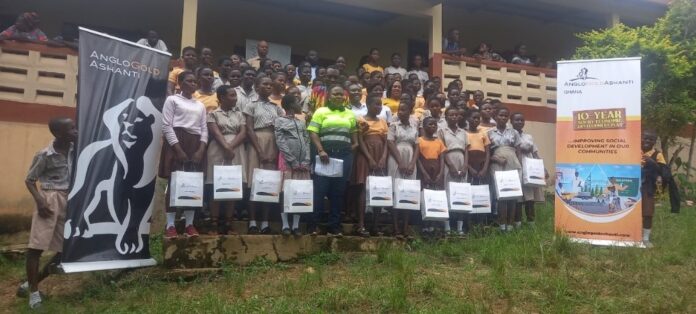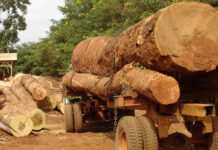
AngloGold Ashanti Obuasi Mine (AGA), in partnership with GIZ, has distributed 1,750 free sanitary pads to girls in some selected Junior High Schools (JHS) within the Obuasi and Obuasi East municipalities.
Each girl child was given five sets of sanitary pads which are expected to last at least five menstrual cycles.
This gesture is part of a two-year initiative by AGA, which aims to distribute 10,000 sets of sanitary pads to girls within the Obuasi enclave. This will be distributed in batches, as 750 sets had already been distributed during the commemoration of ‘Menstrual Hygiene Day’ last May.
The distribution has come at a time when high taxes – 12.5 per cent Value Added Tax (VAT) and 20 percent import duty – have been put on sanitary pads and other sanitary products, thereby soaring their prices. This has made it difficult for some girls, especially in the rural areas, to purchase them. The price of sanitary pads ranges between GH₵17 and GH₵35.
During the distribution, one pupil at Anyinam M.A. JHS, Animah Appiah Amponsah, told the B&FT that she has to starve herself for some days to save money to purchase sanitary pads every month. This, she says, has been going on for the past two years since she started menstruating.
This situation is not peculiar to her, as a number of girls go through similar ordeals or have to stay away from school during their period.
Meanwhile, at a short ceremony to distribute some 1,000 sets of sanitary pads to JHS female pupils in five different schools of the Obuasi municipality, Social Development and Gender Superintendent-AGA Obuasi Mine, Mavis Nana Yaa Kyei, highlighted some reasons behind the initiative.
“In our part of the world, menstrual hygiene management is a challenge that affects the lives of many women and girls. Lack of access to sanitary products, clean water and appropriate facilities poses significant health risks and hampers their ability to participate fully in education, work and social activities. This situation is worsened by the persistent stigma surrounding menstruation, which leads to feelings of shame and exclusion,” she stressed.
She further added that by fostering an inclusive and supportive environment, girls and women can be empowered to take charge of their health, education and overall well-being.
Senior Sustainability Manager, Emmanuel Baidoo, in a speech delivered his behalf observed that since starting the initiative girl-child participation in school work – and even the 2022 Basic Education Certificate Examination (BECE) – has received a major boost.
He commended the Ghana Education Service and Ghana Health Service for their assistance, as the introduction of this initiative contributed to achieving 100 percent participation of girls in the 2022 BECE.
Girl-Child coordinator for Obuasi municipality, Cecilia Salifu, expressed appreciation to AGA for always assisting schoolchildren within the municipality. She added that with the girls having these sanitary pads, it will go a long way to make them stay in school and make learning easy, especially during their period.









